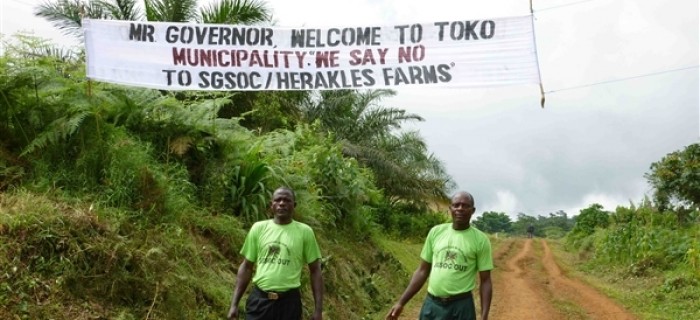Herakles Farms in Cameroon: Agribusiness is the problem, not the solution
Since the 2008 food crisis, investors have increasingly targeted African lands and resources for development, often to the detriment of local populations.i Foreign governments and private corporations are acquiring land across the continent for industrial food, feed and agrofuels production, generally for foreign consumption. In Cameroon, the struggle against New York-based Herakles Farms illustrates the conflict between corporate-driven development and community-based movements for land and food sovereignty.
On May 18, 2013, Herakles Farms announced that, due to governmental injunction, it was suspending operations of its $350 million oil palm plantation project in the Nguti region of Cameroon.ii The suspension was a major milestone for villagers and activists who insist that the project violates Cameroonian law and could endanger wildlife and undermine local livelihoods.iii
The victory however, was short-lived. Just eleven days later, on May 29th, government authorities lifted the ban and allowed Herakles to resume its operations, though in a much-reduced area.
Many villagers along the corporation’s Talangaye nursery have argued that the industrial oil palm plantation will encroach on their lands and adversely affect their livelihoods and food security. A 45-year-old farmer in the Talangaye village told Cameroon state radio, “Our land for cultivation has been given away, and we cannot expand or increase the production for our crops.”iv The plantation would deprive them of land and forest resources that constitute the source of their livelihood, and divert the land away from subsistence food to oil palm. This would in turn decrease the region’s food production and increase its reliance on imported food.
Proponents of agricultural investments such as Herakles Farms contend that Sub-Saharan Africa is home to abundant uncultivated land, and the use of such marginal lands is key to achieving food security, alleviating hunger and addressing poverty on the continent.
What investors and government officials may consider uncultivated and marginal lands however, are often used to meet the various needs of rural households. Local populations use so-called “marginal lands” as a source of medicinal plants, water and wild food.vLarge-scale plantations such as the one planned by Herakles Farms in Cameroon are thus often devastating to rural populations’ livelihoods.
Since Herakles Farms first made public its 73,000-hectares plantation in September 2009, civil society within and outside of Cameroon has engaged in fierce resistance.vi In 2012, a joint report by the Cameroonian non-profit organization RELUFA and the Oakland Institute accused Herakles Farms of submitting a misleading Environmental and Social Impact Assessment (ESIA). In its ESIA, the company claimed that only 14,000 people inhabited the area where the project was being established. Several NGOs, however, estimated that Herakles’ developments would negatively impact more than 45,000 people.vii
Stay in the loop with Food First!
Get our independent analysis, research, and other publications you care about to your inbox for free!
Sign up today!According to the report, the ESIA also failed to mention that the plantation could put thousands of small-scale farmers at risk of losing their lands, and neglected to include any compensation plan. The risk of surface water and ground water pollution as a result of fertilizer and pesticide use was mentioned in the ESIA and the company promised to minimize this risk by using some organic fertilizers, but it did not “give a clear indication of the balance between organic inputs and chemicals.”viii
A study by Cameroonian nonprofit organizations in 2012 found out that the government currently spends about 30 percent of its GDP subsidizing imported food, and that “this spending could be significantly reduced if the government supported local production for domestic consumption instead of focusing on attracting foreign agricultural investments”.ix What Cameroon and Sub-Saharan Africa need are policies that will allow small famers to thrive, boost local food production and define their own food and agriculture policies. Agribusinesses like Herakles Farms are the problem, not the solution to hunger and poverty in Africa.
______________________________
i Baxter, Joan. “Africa’s Land and Family Farms Up for Grabs.” GRAIN, 2009.http://www.grain.org/entries?utf8=?&q=effects+of+the+food+crisis+in+Africa
ii Yuh, Timchia. “US firm forced to shelve $350m Cameroon Plantation project.” May 22, 2013. www.africareview.com/Business—Finance/US-firm-shelves-Cameroon-plantation-project/-/979184/1859662/-/x49w93/-/indexhtml
iii Green Times. “Cameroon Palm Oil Project Finally on Ice.” May 23, 2013.
http://www.thegreentimes.co.za/stories/trees/item/2067-cameroon-palm-oil-project-finally-on-ice
iv “Cameroon NGOs ask U.S. government to investigate palm oil venture” Thomas Reuters Foundation, July 9, 2013. http://www.trust.org/item/20130709090129-hxdkr/?source=hptop
v Kugelman Michael and Levenstein Susan. The Global Farms Race: Land Grabs, Agricultural Investment, and the Scramble For Food Security. Washington DC: Island Press, 2013.
vi Oakland Institute. Understanding Land Investment Deals In Africa. 2012.www.oaklandinstitute.org/files/OI_Ethiopia_Land_Investment_report.pdf
vii Oakland Institute 2012. Op Cit.
viii Oakland Institute 2012. Op Cit.
ix Nguiffo, Samuel and Brendan Schwartz. “Herakles’ 13th Labour? A study of SGSOC’s Land Concession in South-West Cameroon.” Center for Economic Development, 2011.


 Help Food First to continue growing an informed, transformative, and flourishing food movement.
Help Food First to continue growing an informed, transformative, and flourishing food movement.




